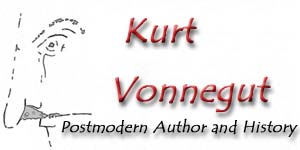| On
the Back of a Roll of Paper¡K
In addition to authorial intrusion, the revelation of the writing process
of the fiction also gives more evidence to show the loss of the traditional
authorial power to offer a linear or well-made plot. Presumably, the more
coherent, convincing and dramatic the plot is, the more the author can
seduce and attract readers into a seamless representation of the make-believe
world.
However, instead of offering any dramatic suspension, readers are told
at the beginning of SF that it will begin with the sentence "Billy
Piligrim has come unstuck in time" and that it will end with "poo-tee-weet?""
We learn every detail of Billy's life not through the chronological development
of the plot, but through apparently random presentation of the character's
moments in life. Therefore, in SF, there is no suspense, or climax
as we can find in traditional novels as the author will keep the controlling
power over his or her readers as involved as possible in the process of
reading, and every revelation of the fictional details follows the logical
sequence of fictional development.
The plot arrangement of BC is also not dramatic or suspenseful.
In BC, we actually have a plot summary of the whole story at the
beginning chapter, while the stories of the meeting between the "two lonesome,
skinny, fairly old white men," Kilgore Trout and Dwayne Hoover, are gradually
revealed. We know the "climax" of the story as Vonnegut points out the
reason of Dwayne Hoover's getting insane. "Here was the core of the bad
ideas which Trout gave to Dwayne: "Everybody on Earth was a robot, with
one exception¡XDwayne Hoover" (14). We also learn the outcome of
these two characters: Trout will have to become "a pioneer in the field
of mental health" and Dwayne must get "carted off to a lunatic asylum in
a canvas camisole" (15). Therefore, the author gives away the control over
the plot in a chronological manner, and appears to be powerless in directing
the act of reading.
Noticeably, in both novels, the narrative intrusions overlap with the
revelation of the writing process in how they affect the author's structural
control over the narrative. In the same way, the exposure of the creative
process also undermines the omniscient and omnipotent power of the author,
since readers learn about the frustration and failure of the working process.
In SF, the Vonnegut persona addresses to the reader his frustration
of incorporating the Dresden memories into a book: "I would hate to tell
you what this lousy little book cost me in money and anxiety and time"
(2). Though the narrator claims that "the best outline . . . , or anyway
the prettiest one, was on the back of a roll wall paper," (5) we learn
as the story goes on that the outline he has worked so many times still
is not accepted by the author at the end.
In BC, the author reveals a parallel situation by telling how
difficult it is to control his characters: "Here was the thing about my
control over the characters I created: I could only guide their movements
approximately, since they were such big animals. There was inertia to overcome.
It wasn't as though I was connected to them by steel wires. It was more
as though I was connected to them by stale rubber bands" (202). Furthermore,
by the schizophrenic dialogues between Vonnegut as author and character,
the frustration and suffering can never be deeper:
"This is a very bad book you're writing," I said to myself behind
my leaks.
"I know ," I said.
"You're afraid you'll kill yourself the way your mother did," I said.
"I know," I said. (193)
From here, we can say that the revelation of the writing process and
the confession of the difficulties in it not only break down the structure
of novel but also threaten the traditional image of the author as a figure
transcending life and turning it into a work of art. The author does not
function as a god-like figure to the text, but rather as a reorganizer
of various writing materials presented to readers. The author explicitly
admits his problematic position in the composing of the fiction, and also
questions his own ability to convey messages by the very narrative he is
working on. Here, along with the belittled image of the writer figure,
Kilgore Trout, the authors "in" both novels also appear to be powerless
in offering a coherent fictional structure and a chronological plot.
|

